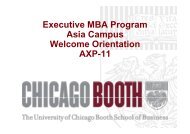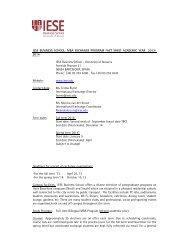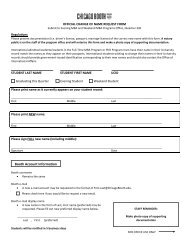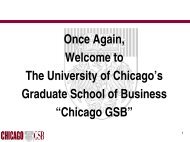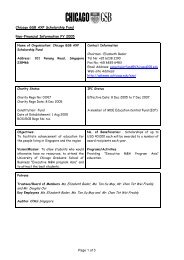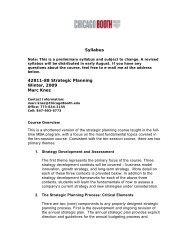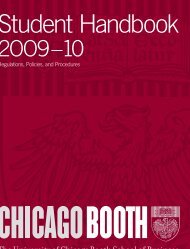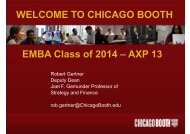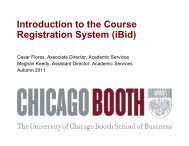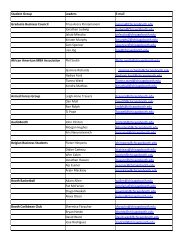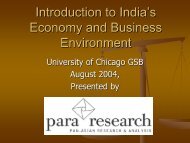LSE exchange student feedback - Chicago Booth Portal
LSE exchange student feedback - Chicago Booth Portal
LSE exchange student feedback - Chicago Booth Portal
You also want an ePaper? Increase the reach of your titles
YUMPU automatically turns print PDFs into web optimized ePapers that Google loves.
Exchange Student from <strong>LSE</strong>/Spring 2006Pre-departureThere are several things which have to be done before departure to <strong>Chicago</strong>. Firstly, it is the visa process. It is sometimes painful process, however,both <strong>Chicago</strong> and London coordinators helped me a lot and finally I haven’t experienced any problems. The only detail I was confused with (and asfar as I know some other people had the same problem) is the SEVIS fee. As a <strong>student</strong>, you need to pay normal visa application fee (around $100)and then another $100 fee called SEVIS. So just be prepared.Secondly I applied for accommodation in International House (more on this later). The application process was smooth. Finally I bid for courses. Theprocess is not easy, it takes some time to become familiar with the system, but every one of us managed it finally.MoneyDuring the term I have spent in total $7800 and I spent in <strong>Chicago</strong> 13 weeks (one before, ten weeks of classes, one week exams and one week after).This amount includes air ticket, insurance, accommodation and all other expenses. It is quite possible to spend less, but not much less though.Although opening an account in the US is not as painful as in London, I was fine the whole term with my credit card with enough high limit (e.g. forpaying the accommodation for the whole term).InsuranceHave a good insurance policy. Any visit to a hospital can be very expensive. There is an option to buy university insurance; however, I found it moreexpensive and not covering as much as my Allianz insurance I bought in my country (Czech Rep.). Check the incoming <strong>exchange</strong> <strong>student</strong> website fordetails about the University of <strong>Chicago</strong> insurance in advance that you can compare it with offers at your home country.AccommodationI lived with many other international <strong>student</strong>s in the International House. I very much liked that, however, not everybody shared my opinion. I willtry to summarize to main pros and cons.© 2007 The University of <strong>Chicago</strong> Graduate School of Business Last Revised 4/10/2007programs.chicagogsb.edu/international/ Page 1 of 4
Pros:- it is cheap- very close to school (it’s nice to leave your place for a lecture five minutes before it starts)- free wireless internet- close to metra station (trains downtown)- bunch of interesting people from around the world- easy to find some mates for a beer- you have a place to live in advance (you don’t have to spend time looking for it)Cons:- small rooms and shared bathroom (however, you don’t have to clean it :-)- kitchen only downstairs (not convenient) and only few dining options around- it’s not downtown (but considering that taxi from downtown costs you $20 and you almost always have somebody to share with I don’t thinkit’s an issue)There are several other options, but I strongly believe that I-House was the best choice.SchoolThe courses at the GSB are very interesting and very different from courses at <strong>LSE</strong>. Maybe the biggest difference is that the teachers are very wellprepared for each lecture and that they are not only good scientists, economists and researchers but at the same time very good teachers which is notalways the case at <strong>LSE</strong>. My general recommendation would be the following. At <strong>LSE</strong> do any good theoretical courses and leave all practical coursesfor the GSB. At <strong>LSE</strong> there are several courses which look practical, however, these can hardly beat the GSB’s. On the other hand, at the GSB youcan hardly teach a theory (they are using it as given and you are just applying it).At the GSB you can do three to five courses. There is no incentive to take more than three, since at <strong>LSE</strong> the term abroad is accounted for one unitregardless how many courses you are taking. I did three courses and had a hard time taking into account that I had to do <strong>LSE</strong> exams at the end ofGSB term. However, four courses are doable including decent time for a beer. Doing five courses is very difficult and I don’t think that it’s worth itsince you are on the <strong>exchange</strong> not only to study, but also to meet people and have some fun.© 2007 The University of <strong>Chicago</strong> Graduate School of Business Last Revised 4/10/2007programs.chicagogsb.edu/international/ Page 2 of 4
I had three <strong>LSE</strong> exams in spring which I had to take at the time when the GSB term was finishing. The pressure was quite high and I recommend youto take two or preferably less courses which have the proper <strong>LSE</strong> exam.My courses at <strong>LSE</strong>:Strategy A – Basic strategy course thought by Prof. David DeMeza. David is a very smart man and the course is very mind challenging. It is alsovery much theory focused – lot of game theory and some other models.Systems Thinking with Strategic Modelling – very good course thought by D.C. Lane which is the best prepared teacher I have ever met. Also thetopic is very interesting. This course has no exam in spring which makes it even more appealing for <strong>exchange</strong> <strong>student</strong>s.Incentives and Governance in Organization – another theory focused course. And another course I liked.Valuation and Security Analysis – this was a course which I wouldn’t recommend. It was actually horrible. Bad teacher teaching you efficient markettheories (which would be fine, but then change the name of the course) and then marking you based on the valuation projects without explaining howto do valuation. I had the same course at the GSB and it was much better and actually thanks to the GSB course I know how to value a company. Fora comparison to <strong>LSE</strong> we did the valuation project in team of six people and we worked on it for six or seven weeks. The output was horrible andnone of us actually knew what we had done. After the course at the GSB, we did a final valuation project as well, everybody did it alone and we hadto do it in a few days. And more importantly the output was much more accurate. This experience led to my earlier statement that the applied coursesare better at the GSB.At the GSB I had following courses:Competitive Strategy – with Prof. Knez. This was applied, case study based strategy course which was a great combination with the strategy coursefrom <strong>LSE</strong>.Financial Statement Analysis – with Prof. Wong. This is the valuation course which was much better than the <strong>LSE</strong> Valuation and Security Analysis. Iliked Prof. Wong, very much however, some people said that Piotroski is better.Applied Regression Analysis – this course teaches you, as expected, how to regress. I had it with Prof. Hansen and he was very good. He was evenable to make something like statistics interesting and even funny. You need a basic statistics background, but really basic is enough.© 2007 The University of <strong>Chicago</strong> Graduate School of Business Last Revised 4/10/2007programs.chicagogsb.edu/international/ Page 3 of 4
If you would like to learn something about finance, I would recommend leaving it for the GSB. Nowadays, the GSB is top in finance and courses arevery good varying from the easiest, beginners courses to PhD level research focused classed with people like Prof. Fama.After School<strong>Chicago</strong> is good place to be to do some after school stuff. Concerning sports there is big Ratner sport centre where all the GSB <strong>student</strong>s have freeaccess. The centre is pretty new and the facilities are really good including 50m swimming pool and two basketball gyms.Night life in <strong>Chicago</strong> is really rich and there are plenty of opportunities. There is not much to say about it – just explore as often as you can. Anddon’t forget that on Fridays the party starts at the GSB thing called LPF – basically free food and drinks. If you go there don’t expect to do somework later on Friday.Just one tip: if you like good meat go to Fogo de Chao, it’s a really good restaurant.BuddyEvery <strong>exchange</strong> <strong>student</strong> is assigned a buddy. Use this opportunity for tips about GSB, course selection, housing etc. They are really good source ofinformation.Any more questions? Contact meDavid Chmelardavid@chmelar.net© 2007 The University of <strong>Chicago</strong> Graduate School of Business Last Revised 4/10/2007programs.chicagogsb.edu/international/ Page 4 of 4



